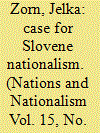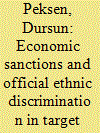| Srl | Item |
| 1 |
ID:
086962


|
|
|
|
|
| Publication |
2009.
|
| Summary/Abstract |
When Slovenia became a sovereign state in 1991, it had to define who its citizens were. Were all residents of Slovenia, regardless of their ethnic belonging, equal in this respect? This article provides an answer to this question by elucidating certain parts of the secession legislation - the initial designation of citizenry and one of its indirect outcomes, the erasure from the register of permanent residents. The ethnic/civic dichotomy will be applied in order to demonstrate opposing nationalist claims made by the ruling elite. In terms of specific processes, Slovene nationalism will be presented in three distinct phases: counter-state nationalism (before the break-up of Yugoslavia), state-building nationalism (the initial designation of citizenry), and the nationalising state (after the secession; marked by the erasure and threats to revoke citizenship statuses of naturalised citizens).
|
|
|
|
|
|
|
|
|
|
|
|
|
|
|
|
| 2 |
ID:
144786


|
|
|
|
|
| Summary/Abstract |
Conventional studies on the consequences of sanctions tend to focus on the target society as a whole without specifying how foreign economic pressures might affect the well-being of vulnerable groups within target countries – the same groups who often disproportionately bear the burden of sanctions. This study explores the extent to which sanctions increase the likelihood of discriminatory government practices against one of the globally most vulnerable groups, ethnic groups. It is argued that sanctions contribute to the rise of official ethnic-based economic and political discrimination through contracting the economy and creating incentives for the target government to employ ethnic-based discriminatory policies. Using data on over 900 ethnic groups from 1950 to 2003, the results lend support for the theoretical claim that sanctions prompt the government to pursue ethnic-based discriminatory economic and political practices in multiethnic countries. The findings also indicate that multilateral sanctions are likely to be more harmful to the well-being of ethnic groups than sanctions levied by individual countries. Further, the negative effect of comprehensive sanctions appears to be greater than that of sanctions with moderate and limited impact on the target economy. The regime type of the target state, on the other hand, appears to have a significant role only in conditioning the hypothesized effect of sanctions on economic discrimination. Overall, this study’s focus on a vulnerable segment of the target society – ethnic groups – offers a greater understanding of the consequences of sanctions. It also provides additional insight as to how, in multiethnic countries, political elites might domestically respond to external pressures to retain power.
|
|
|
|
|
|
|
|
|
|
|
|
|
|
|
|
| 3 |
ID:
147663


|
|
|
|
|
| Summary/Abstract |
Based upon the data from qualitative studies of eight national minorities between the Baltic and the Danube, this article investigates the formation of European identification among members of the minority groups representing ‘split nations’ along the new eastern borders of the enlarged EU. The analysis reveals mechanisms of the formation of supranational identification by focusing on the relationships between subnational, national and European identifications to ascertain the degree of interconnectedness of these identification levels. These relationships are examined in the context of the potential impact of perceived ethnic conflict and utilitarian expectations of socio-economic and cultural gains from the process of European integration.
|
|
|
|
|
|
|
|
|
|
|
|
|
|
|
|
| 4 |
ID:
126868


|
|
|
|
|
| Publication |
2011.
|
| Summary/Abstract |
The article presents the author's views regarding the house demolition policy in Israel and its possible effects to Palestinian Arabs who have resided at the Occupied Palestinian Territories (OPT). The author denotes the evidence of ethnic discrimination shown by Israeli government against the Palestinians. The author denotes the demolition of the settlers' houses and cites the reaction of these people. Moreover, the Judaization goal of the government is also mentioned.
|
|
|
|
|
|
|
|
|
|
|
|
|
|
|
|